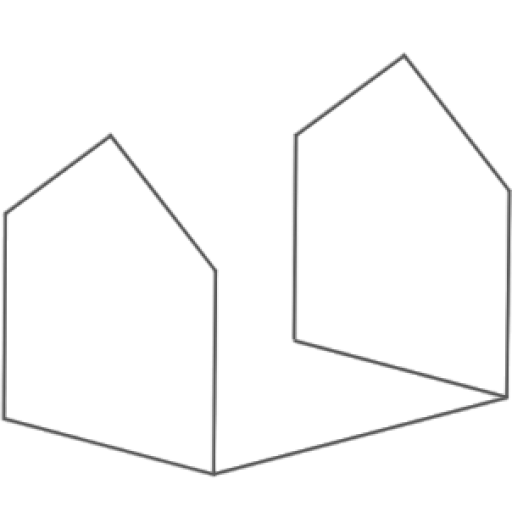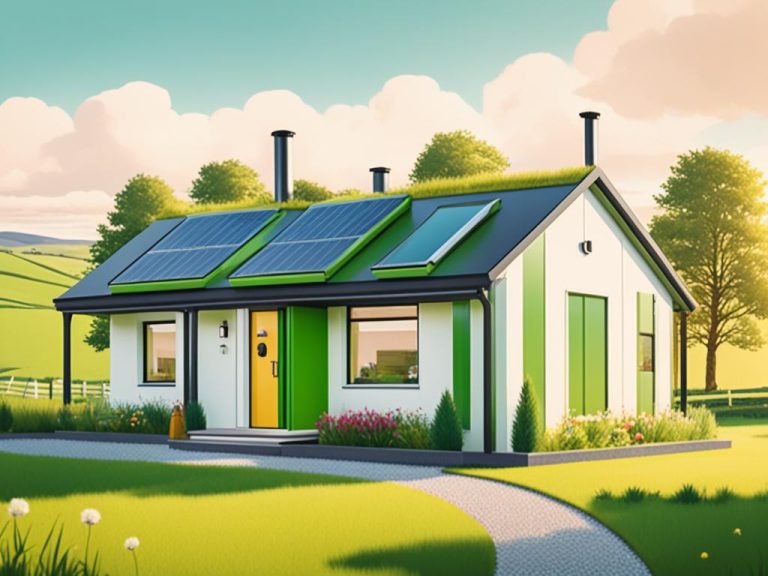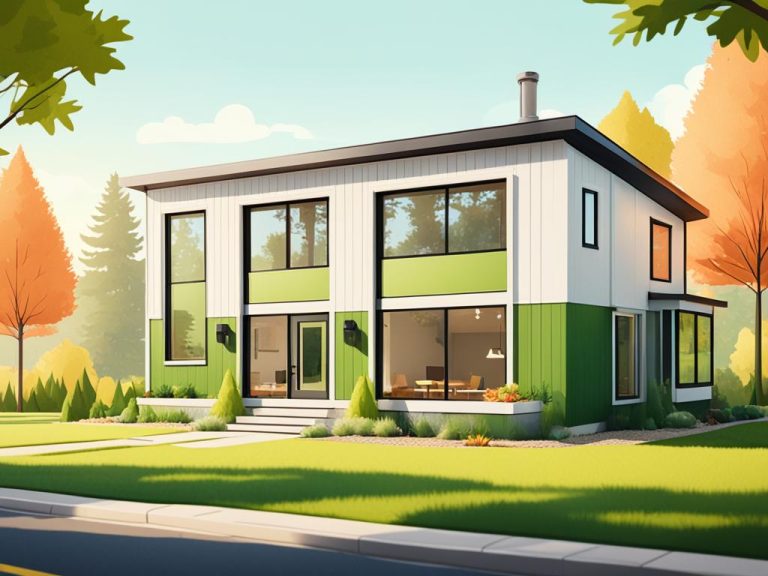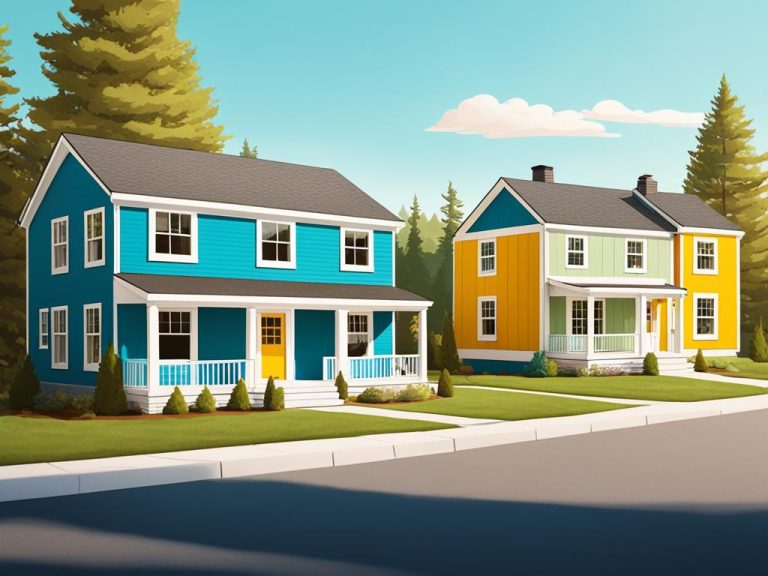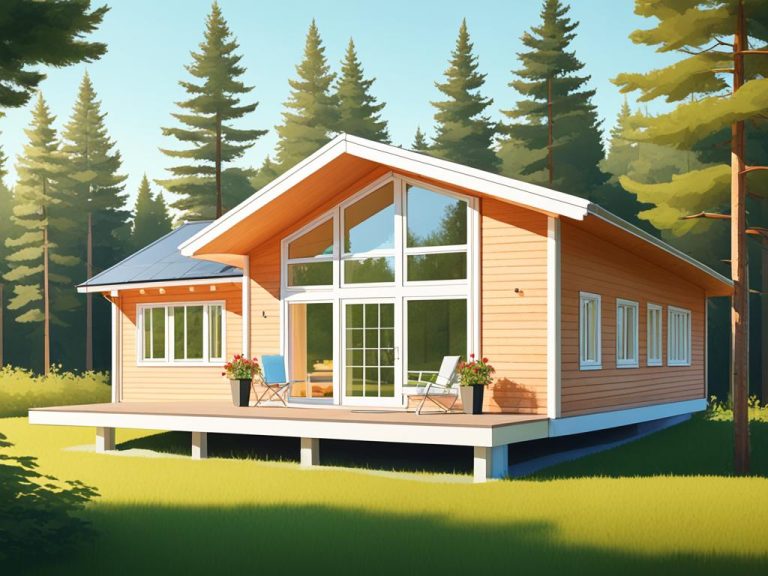Modular Home Build: Construction Loan Options
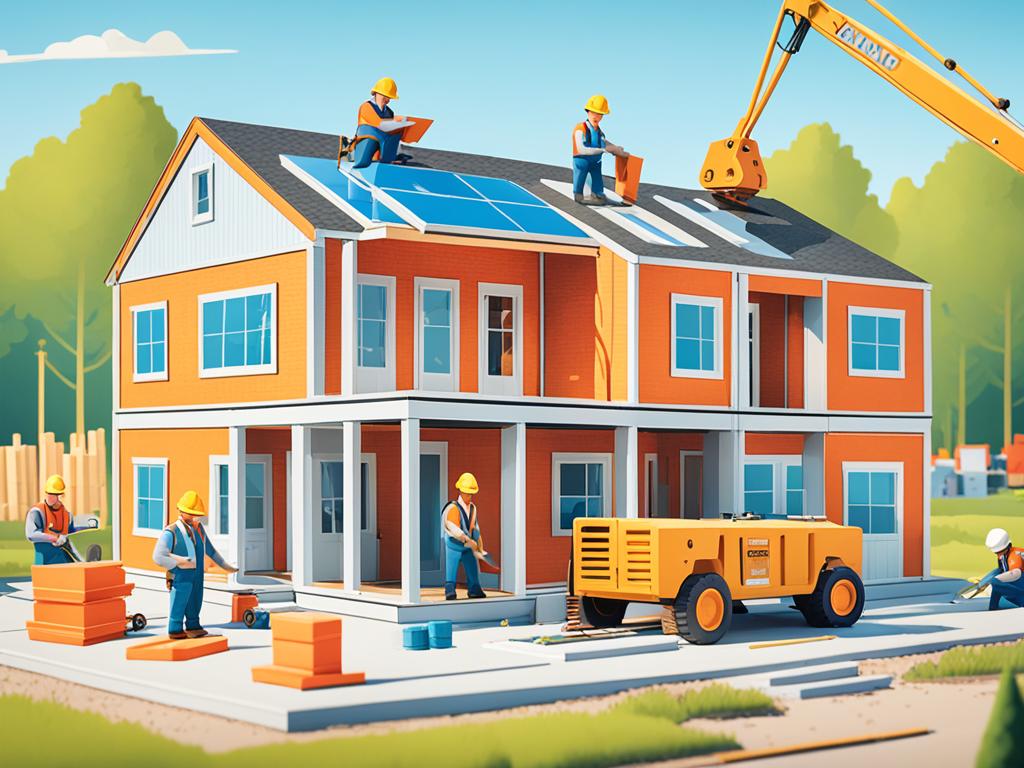
Are you planning to build your dream modular home? One crucial aspect to consider is securing the necessary financing. A construction loan for a modular home can provide the funds you need to bring your vision to life. In this article, we’ll explore the various construction loan options available to you and discuss how they can benefit your modular home construction project.
Key Takeaways:
- Construction loans offer short-term financing for modular home construction projects.
- They cover the cost of building the modular home and are converted into a mortgage once construction is complete.
- Financing for modular home construction can come from banks, credit unions, mortgage companies, or the modular home dealer.
- Requirements for construction loans may include a good credit score, financial documents, and a minimum down payment.
- Choosing the right construction lender is crucial for obtaining competitive terms and rates.
Financing Your Modular Home Construction
When it comes to financing your modular home construction, there are a variety of options available. You can secure a construction loan from a bank, credit union, mortgage company, or even directly from the modular dealer or modular general contractor. It’s crucial to thoroughly research and understand the financing options provided by your chosen modular home builder.
Additionally, there are alternative financing options you can explore, such as conventional loans, FHA loans, VA loans, USDA loans, personal loans, and chattel mortgages. Each financing option has its own set of requirements and benefits. It’s essential to compare and assess these options to make an informed decision that aligns with your financial goals and circumstances.
When considering your financing options, it is important to keep in mind the interest rates, loan programs, and repayment terms that best suit your needs. By exploring various financing avenues, you can find the solution that provides the most favorable rates and terms for your modular home construction project.
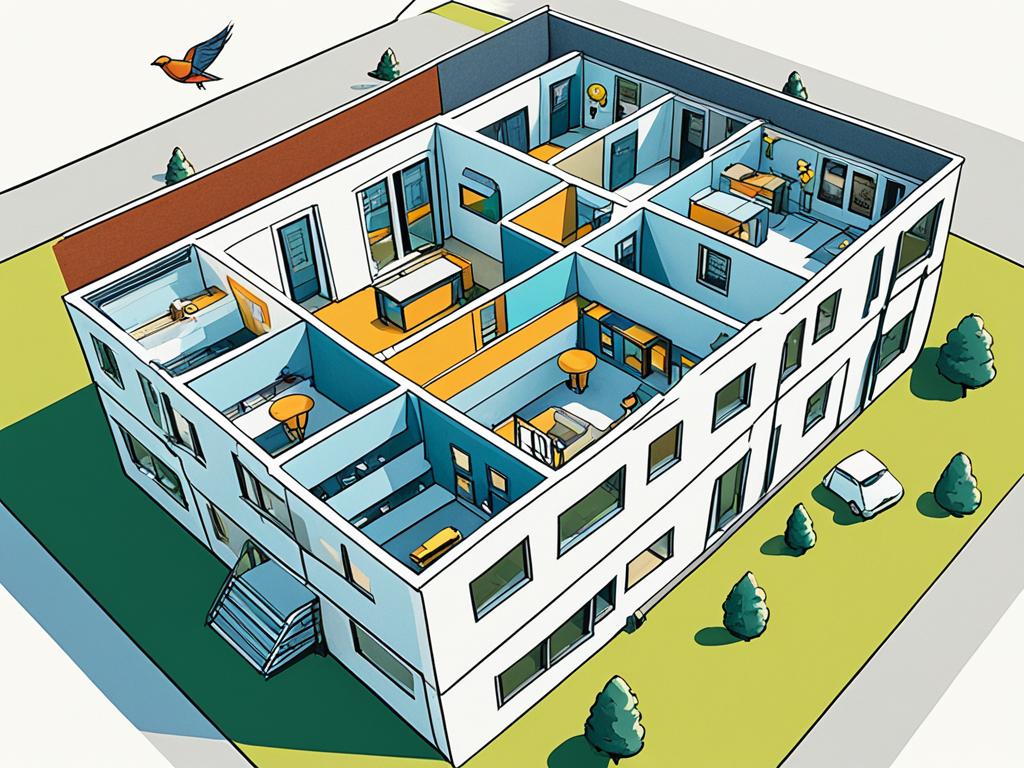
Remember, financing for modular home construction is a significant aspect of your project, and the right financing can help make your dream home a reality. Take the time to research and compare, ensuring that you secure the financing option that best meets your needs and allows you to embark on your modular home construction journey with confidence.
Construction Loan Requirements and Eligibility
To qualify for a construction loan for your modular home, there are specific requirements and eligibility criteria you need to meet. Lenders typically look for a good credit score of around 700 or higher. However, some lenders may consider lower scores based on individual circumstances. Along with your credit score, you will need to provide documents like tax returns, income statements, and details of any existing debt.
The lender will also assess the future value of your modular home and may require a minimum down payment, usually around 20% of the total construction costs. This down payment is a crucial factor in securing a construction loan for your prefabricated home.
Discussing these requirements with the lender and understanding the specific terms and conditions is essential. It helps you prepare in advance and increase your chances of qualifying for a competitive modular home construction loan rate.
Before diving into the details of the loan application process, it’s worth considering an image that showcases the construction of a modular home.
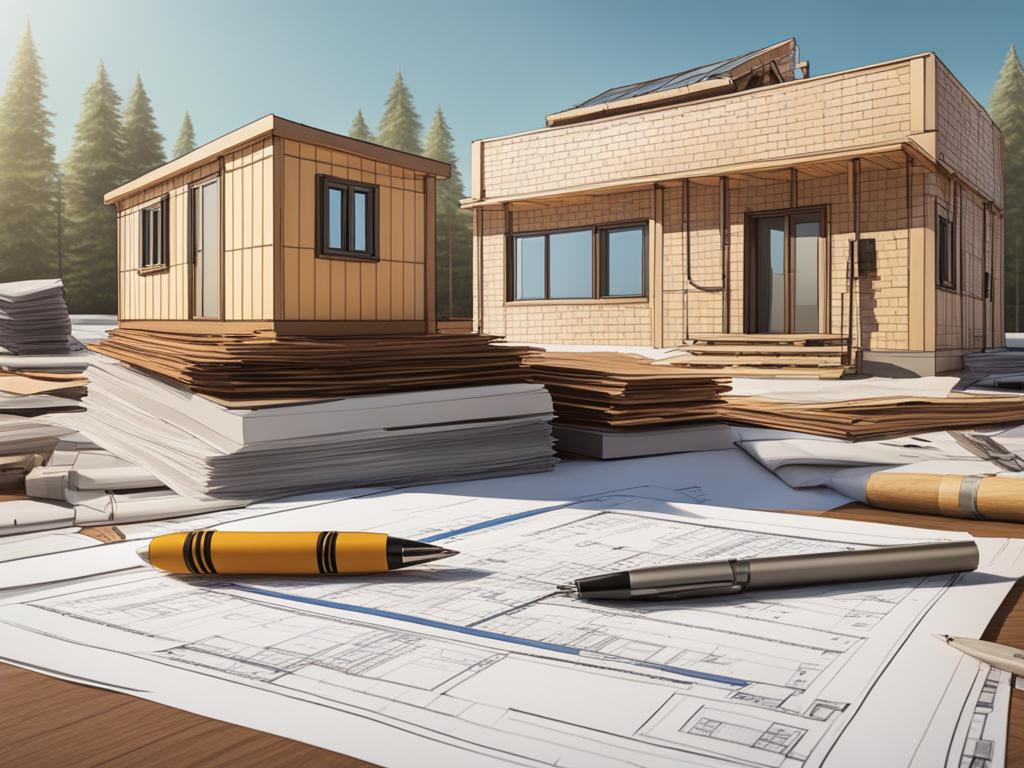
Now let’s move on to the next section, where we’ll explore the construction loan process in more detail.
Choosing the Right Construction Lender
When it comes to financing the construction of your modular home, selecting the right construction lender is paramount. For a smooth and successful experience, it is recommended to opt for a small-town local bank. These banks have an intimate understanding of the local community and possess extensive experience in providing construction loans. Their knowledge of the area can be particularly advantageous as they are familiar with the unique requirements of financing a modular home construction project.
If you already have an existing bank, it’s a good idea to reach out to them and inquire if they offer construction loans. In the event that they do not, they can provide valuable recommendations and refer you to other lenders who do. When engaging with potential lenders, ensure they can provide competitive terms and rates that align with your financial goals and capabilities.
To enhance your understanding of the lender’s expertise and their track record in construction loans, do not shy away from asking questions. Seek clarity on their experience with modular home construction loans specifically and assess their ability to cater to your unique needs. By doing so, you can secure a construction lender who will guide you through the process and ensure your modular home construction is financed appropriately.

- Opt for a small-town local bank
- Inquire about construction loan availability at your existing bank
- If unavailable, ask for lender recommendations
- Assess lender’s knowledge of modular home construction loans
- Seek competitive terms and rates
- Ask questions to gauge lender’s expertise and suitability
The Construction Loan Process
The process of obtaining a construction loan for a modular home involves several important steps. By understanding and following these steps, you can ensure a smooth and successful construction loan experience.
1. Pre-Approval Process
The first step in the construction loan process is the pre-approval process. During this stage, you will provide the lender with the necessary financial documents for assessment. These documents will include details about your income, assets, and credit history. The lender will review these documents to determine your eligibility for a construction loan.
2. Searching for Land and a Builder
Once you are pre-approved for a construction loan, you can begin searching for the ideal plot of land and a reputable builder who specializes in modular home construction. It is important to stay within the budget approved by the lender and to choose a location that meets your needs and preferences.
3. Submitting Construction Plans for Approval
Before construction can begin, you will need to submit detailed construction plans to the lender for approval. These plans will outline the design and specifications of your modular home. The lender will review the plans to ensure they comply with local building codes and regulations.
4. Disbursement of Funds
During the construction phase, the lender will disburse funds to cover the ongoing costs of building your modular home. This is typically done in draws, which are payments made at specific stages of the construction process. The lender will monitor the progress of the construction and release funds accordingly.
5. Completion and Transition to a Mortgage
Once the construction is complete and all necessary inspections have been carried out, the construction loan will be converted into a traditional mortgage. This means that you will begin making regular mortgage payments based on the terms and conditions agreed upon with the lender. At this point, you will officially own the completed modular home.
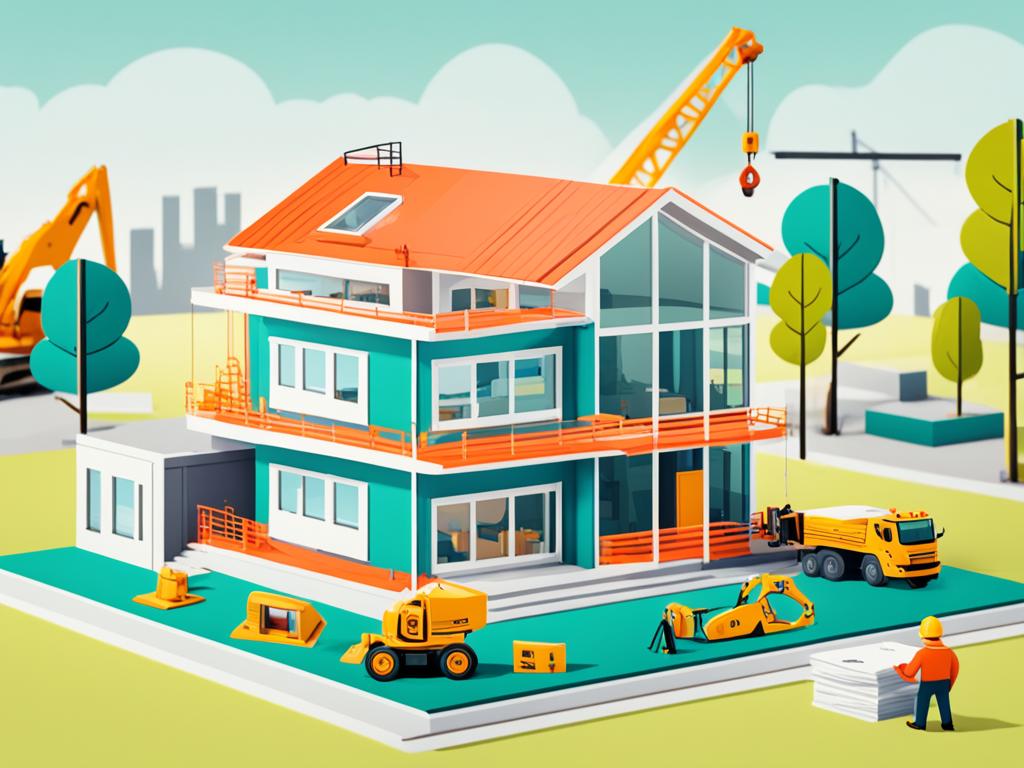
Pros and Cons of Construction Loans
Construction loans for modular homes offer both advantages and disadvantages. Evaluating these pros and cons is crucial before deciding on a construction loan for your prefabricated home project.
Advantages:
- Finance the Entire Construction Process: With a construction loan, you can secure funding for every stage of your modular home construction, from start to finish.
- Protection for Both Buyer and Lender: Construction loans provide safeguards for both parties involved. If any obstacles arise during construction, such as delays or unexpected costs, the loan ensures that both the buyer and the lender are protected.
- Flexibility to Customize: One of the main advantages of construction loans for modular homes is the flexibility to customize your dream home according to your preferences and needs. You can design a home that suits your lifestyle and reflects your unique taste.
Disadvantages:
- Significant Down Payment: Construction loans typically require a substantial down payment, usually around 20% of the total construction costs. It’s important to be prepared for this financial commitment.
- Higher Interest Rates: Compared to traditional mortgages, construction loans often come with higher interest rates. It’s essential to consider the long-term financial implications when evaluating this financing option.
- Potential for Increased Costs: Construction delays can lead to additional expenses, such as extended borrowing periods and increased interest charges. It’s crucial to factor in the possibility of unexpected construction delays when assessing the overall costs of your modular home project.
By carefully weighing the advantages and disadvantages, you can make an informed decision about whether a construction loan is the right financing option for your modular home construction. Remember to consider factors such as your budget, timeline, and personal preferences to ensure a successful and rewarding home-building experience.
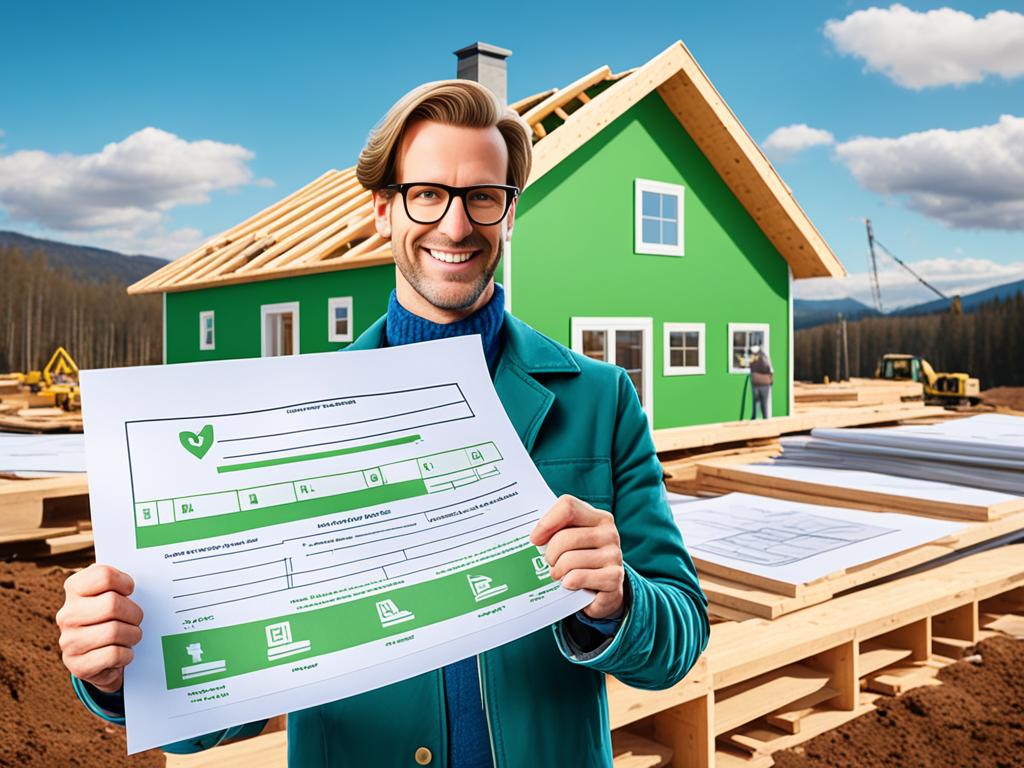
Conclusion
Obtaining a construction loan for a modular home provides the necessary financing to bring your dream home to life. With the wide range of modular home construction loan options available, it’s important to explore different lenders and understand their requirements and terms.
By choosing a reputable lender and familiarizing yourself with the loan process, you can make an informed decision that aligns with your financial goals. Additionally, considering the pros and cons of construction loans can help you weigh the benefits and potential drawbacks.
With the right construction loan, you can efficiently finance the construction of your modular home and enjoy the flexibility to customize your residence. Don’t forget to consult with professionals and do your research to make the best choice for your project. Start today and turn your modular home dreams into a reality!
FAQ
What is a construction loan for a modular home?
A construction loan is a short-term loan that covers the cost of building a modular home. It is typically provided by a bank, credit union, or mortgage company and is converted into a mortgage once construction is complete.
Where can I obtain financing for modular home construction?
Financing for modular home construction can be obtained from banks, credit unions, mortgage companies, or even the modular home dealer or contractor. It is important to research and understand the financing options offered by your modular home builder.
What are the requirements for a construction loan for a modular home?
To qualify for a construction loan, most lenders will require a good credit score, financial documents like tax returns and income statements, and a minimum down payment of around 20% of the total construction costs.
How do I choose the right construction lender for my modular home build?
It is recommended to reach out to your existing bank and inquire if they offer construction loans. If they don’t, they can refer you to other lenders who do. Look for a lender who understands the unique requirements of financing a modular home construction project and can provide competitive terms and rates.
What is the process for obtaining a construction loan for a modular home?
The process starts with pre-approval, where you provide financial documents to the lender for assessment. Once pre-approved, you can start searching for land and a builder within the approved budget. Detailed construction plans need to be submitted to the lender for approval. During construction, the lender disburses funds in draws to cover the ongoing costs. Once construction is complete, the loan is converted into a traditional mortgage.
What are the pros and cons of construction loans for modular homes?
Pros include the ability to finance the entire construction process, protection for both the buyer and lender, and the flexibility to customize the home. Cons include the need for a significant down payment, higher interest rates compared to traditional mortgages, and the potential for increased costs due to unexpected delays.
How can a construction loan benefit me in financing my modular home construction?
By exploring different financing options and understanding the requirements, eligibility, and terms associated with construction loans, you can make an informed decision and efficiently finance the construction of your modular home.
